In a world where speed, sustainability, and self-care are gaining more value than ever, cycling—or cyclisme in French—has risen from a simple mode of transport to a global movement. Whether it's the thrill of racing down a mountain trail, the calm of a morning ride through the city, or the discipline of professional competition, cycling brings together fitness, freedom, and environmental awareness in a way few other sports can.
A Journey on Two Wheels
Cyclisme isn’t just about the bike—it's a lifestyle. From casual riders to competitive athletes, cycling appeals to all ages and skill levels. In cities across Europe, especially in countries like France, the Netherlands, and Denmark, bicycles are part of everyday life. In these urban spaces, the bike is more than transport; it's a cultural symbol of balance, efficiency, and eco-conscious living.
Health and Fitness Benefits
Riding a bike is one of the most effective full-body workouts. It improves cardiovascular health, strengthens muscles, burns calories, and enhances mental well-being. Unlike high-impact sports, cycling is gentle on the joints, making it a perfect long-term fitness option for people of all ages.
According to health experts, just 30 minutes of moderate cycling per day can:
Reduce the risk of heart disease
Improve lung capacity
Boost mood and mental health
Enhance coordination and balance
Competitive Cycling: Where Passion Meets Performance
For many, cyclisme goes beyond leisure. The world of competitive cycling is intense, thrilling, and inspiring. Events like the Tour de France, one of the most prestigious cycling races in the world, showcase the strength, endurance, and strategy required at the highest levels.
Competitive cycling includes various disciplines:
Road Cycling: Long-distance racing on paved roads.
Mountain Biking: Off-road challenges over rugged terrain.
Track Cycling: High-speed racing in velodromes.
Cyclocross: A mix of road and off-road racing with obstacles.
BMX: Stunt riding and racing on specially built dirt tracks.
Each discipline offers unique challenges and draws in thousands of fans and athletes globally.
The Environmental Edge
Cycling isn’t just good for the body—it’s great for the planet. With rising concerns about climate change and air pollution, more cities are investing in bike-friendly infrastructure. Choosing a bicycle over a car for daily commutes helps reduce greenhouse gas emissions, noise pollution, and traffic congestion.
In fact, if more people adopted cycling as a primary form of transportation, the impact on global carbon footprints could be substantial.
Cycling Culture: A Community on the Move
What makes cycling truly special is the community behind it. From local riding clubs to global cycling events, there’s a deep sense of connection among cyclists. It’s a sport that brings people together—whether they ride for fun, fitness, or professional glory.
Cycling also encourages mindfulness and exploration. It invites you to slow down, observe your surroundings, and embrace the journey—not just the destination.
Conclusion
Cyclisme is more than a Sports Nouvelles—it's a revolution of health, harmony, and hope. Whether you’re riding to stay fit, commute sustainably, or chase competitive dreams, cycling offers something for everyone. With each pedal stroke, you move not just your body, but also the world, toward a brighter and healthier future.
So grab a helmet, hop on your bike, and let the road ahead inspire you. Vive le cyclisme!







